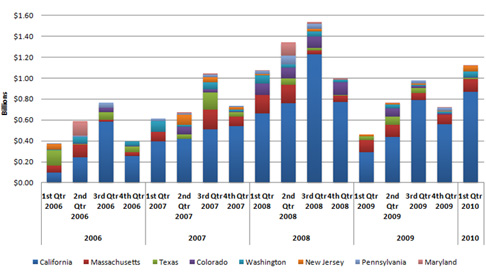Submitted by Dallas Kachan on

Efforts to repeal California's progressive emissions reduction law are gaining steam heading into the state's general elections this November. Which could make for some real fireworks in California this summer.
The fate of the bill is likely to become a central issue in the elections. Already, both Republican gubernatorial candidates have called for suspending the state's Global Warming Solutions Act of 2006, first introduced as AB 32.
With the rhetoric intensifying, it begs the question of what effect the legislation has had on the state's clean technology sector and job creation.
While the data below doesn't prove causality, figures tracked by the Cleantech Group show California—the blue segment of the bars below—became the clear dominant U.S. state for cleantech investment in 2006, when AB 32 was signed into law.
Since then, in every quarter since 3Q06, just as the bill was about to be signed, cleantech companies based in California have attracted hundreds of millions of dollars in venture financing, dramatically more than any other state. And the gap has widened over time.
Quarterly Cleantech Investment in Top U.S. States 
Source: Cleantech Group
Why is the amount of venture investment material?
Venture capital has proven to be the fastest, most efficient driver of job creation. A Cleantech Group analysis in conjunction with environmental policy advocates Environmental Entrepreneurs (E2), estimated that 2,700 direct jobs are created for every $100M in venture investment, or about $37,000 per job on average.
By contrast, stimulus spending is much more expensive, and takes longer. U.S. President Obama has said that the $825 billion in U.S. stimulus would create or save between 3 million and 4 million American jobs by 2010. That's $235,000 per job—more than six times more than venture capital. And it's considerably slower, given the time required for stimulus grant application, selection and funding.
Efforts are underway to gather signatures for a voter ballot initiative which would suspend California's AB 32, widely accepted as one of the most progressive climate change laws in the world. Critics blame it for job losses in the state, calling the law "the most draconian regulatory regime" in California's history.
Supporters of AB 32 blame Texas oil companies for funding the initiative, and say it would destroy the fastest-growing segment of California's economy (i.e. cleantech) and put at risk those billions of dollars of investment above in clean technology companies that have been creating jobs in the state.
AB 32 takes emission controls well beyond freeway vehicles into complex areas such as power generation, industry practices and building requirements. It requires that by 2020 the state's greenhouse gas emissions be reduced to 1990 levels, a roughly 25 percent reduction under business as usual estimates.
Should the ballot initiative gather enough signatures, the decision to repeal AB 32 will be left to California voters at the polls in November.
A former managing director of the Cleantech Group, Dallas Kachan is now managing partner of Kachan & Co., a cleantech research and advisory firm that does business worldwide from offices in San Francisco, Toronto and Vancouver. Its staff have been covering, publishing about and helping propel clean technology since 2006. Kachan & Co. offers research reports, consulting and other services that help accelerate its clients’ success in clean technology. Details at www.kachan.com.
